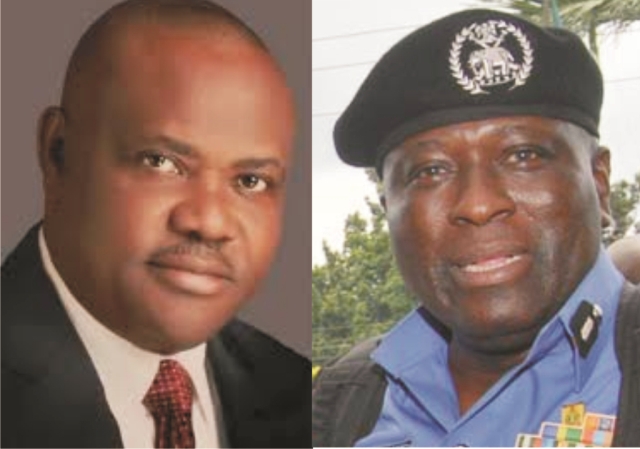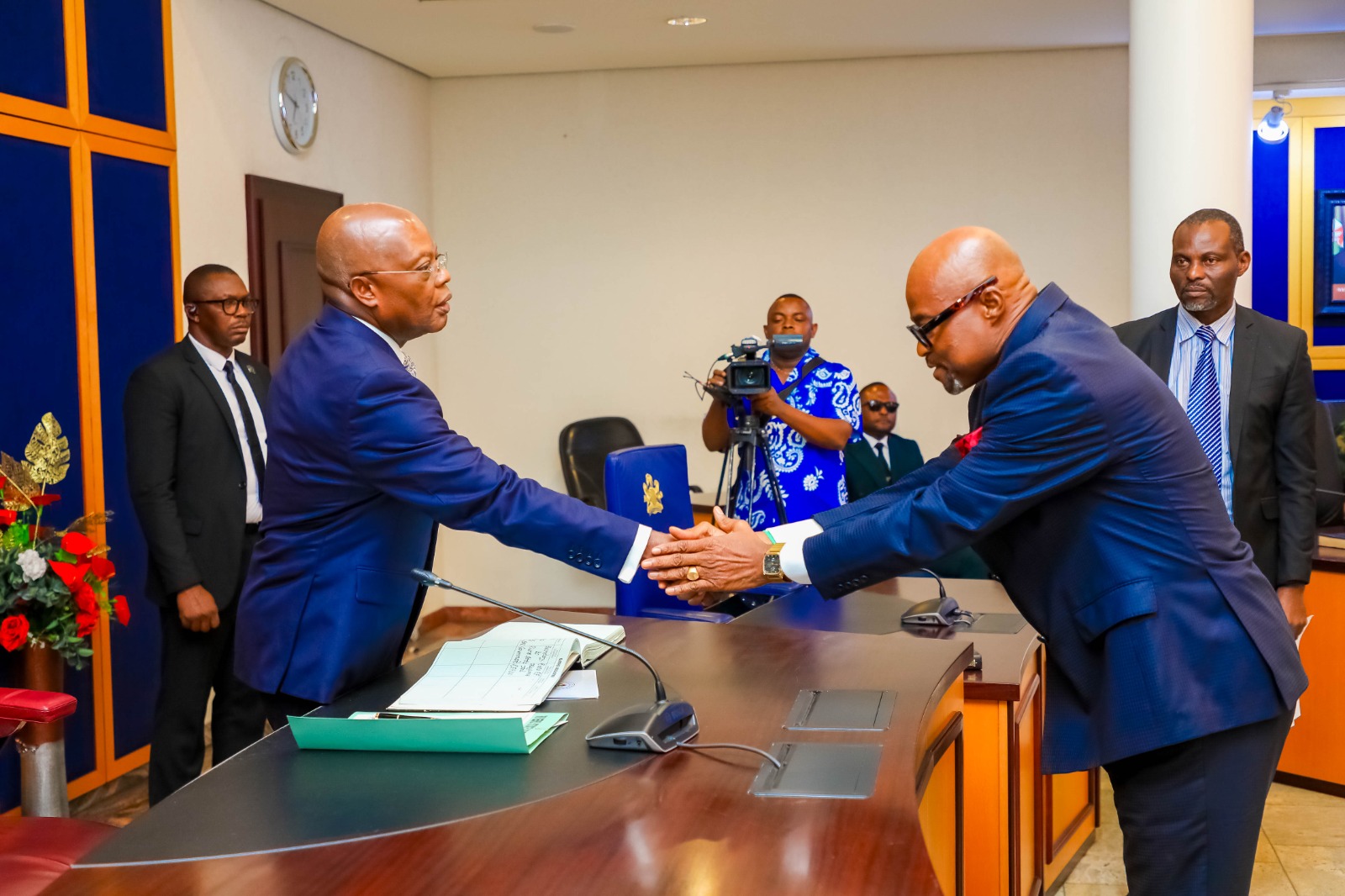Featured
Engaging The Cultists …The Rivers Example

On New Year eve, amidst the familiar fire works in disobedience of regular Police warning, gunmen, suspected to be cultists invaded Marine Base. By the time residents realized that the bangs were gun-shots and made distress call to the Police, two bodies were found lifeless in a pool of their own blood.
One was later identified as an enemy ‘combatant’, while the second was a driver with the Rivers State Newspaper Corporation, on official duty that had nothing to do with cultists and their activities. He was caught up in the cross-fire, an innocent death.
That incident is only one of several examples of collateral damages to cult-related violence, senseless bloodletting and incessant warfare for either supremacy or reprisal. Infact, many innocent citizens have paid the supreme price, without necessarily being partakers of the orgy of violence known to cult gangs.
On the last count, some local government areas in Rivers State were invaded by competing cult groups, leaving behind every such attack, dead bodies, among them innocent defenceless men, women and children.
Most of these cult gangs are so heavily armed that they can take-over and run a community to the utter helplessness of local authorities. In some communities, they are governments unto themselves and impose all manner of sanctions for disobedience. Where there are sources of ready funds from either state, federal and or oil production activities, the rivalry among such cult groups is often fiercest.
The history of the armed gangs is traceable to many sponsors, key among them are politicians who most often were said to have armed them as alternative security men and thugs, during elections, with promises of heaven on earth.
These young men were very often abandoned by such benefactors afterwards without any effort to retrieve their weaponry. And so, like the monster that outgrows his master, the cult groups become danger not only to their masters but also to society from which they must feed.
The warfare is also very deadly where two or more such groups are domiciled in the same locality and one seen to be favoured by public institutions against others. In such rivalries, the ambition of each group is usually to instill fear and force obedience from ordinary people. At other times, efforts are made to enlarge membership through forced initiations.
By such brute force, they enforce their own laws and order and eventually earn phoney legitimacy from among the populace who out of fear become subservient. At such times, rival groups also stockpile arms to dislodge the status quo, and the cycle continues.
Such is the near-frequent recourse to violence. Some of them are also accused of complicity in the incessant cases of kidnap in the state and elsewhere, with inexplicable ransom-demands that eventually make the trade a lucrative pastime. But kidnapping is not the only indiscretion often ascribed to such groups. Some of their members it is said are also believed to be into robberies of different kinds.
What is astonishing is that it is believed that the Police indeed know the leaders and even members of such groups. They also know their hide-outs and could indeed engage them to a stand-still.
But to the Police, such confrontation would be futile without the required political will of the government in power. This is because, without such needed assurances, such Police officers would merely endanger their jobs and or lives, because it is often difficult to know the support base of such cultists.
One could be arrested one day, only to get an ‘order from above’ to release such ‘innocent citizen’ only for such suspect to mock the Police men and loudly celebrate his freedom.
For such reasons, even some policemen, it was once alleged, also ‘blend’ a term commonly used to mean ‘initiation’ to enjoy the protection of a powerful cult.
Curiously, many citizens believe that the strength of the Police can only be noticed, when there is a police casualty in cross-fire. Police search, in such instances, is often very thorough, decisive and committed. At such times, the consideration of possible assailant’s powerful backers and a political will to back-up their reaction to their own dead ones, do not count. It is indeed in such an instance when it is best to find the best in policemen.
Aside from that, even the Police is often helpless. That is why the resolve of Rivers State Governor, Chief Nyesom Ezenwo Wike to partner the State Police Command in taking the anti-crime war to the cult groups is most noteworthy.
After the initial raid of cult havens in Obio/Akpor Local government Area, Governor Wike’s own LGA, where buildings of cult-gangs and kidnappers were demolished and land, recovered for public use, the Governor’s battle continued at the weekend, with a raid of similar cult havens at Eagle Island, in Port Harcourt City.
Joined by the new State Commissioner of Police, Mr. Foluso Adebanjo, Governor Wike personally supervised the demolition of two alleged deadly cultists’ camps, one of them located behind the Redeemed Christian Church of God and the other one simply called Andoni Camp.
Like that in Obio/Akpor, Governor Wike announced that a Police Station will be built at the camp behind the Church while a community hospital will replace the Andoni Camp. Addressing the security afterwards, Wike assured that the demolition of cultists’ hide-outs will continue until innocent citizens know peace and sleep with both eyes closed.
The security action is coming after Governor Wike had appealed to the youth involved in crime, to denounce their trade, embrace peace and be granted amnesty. Governor Wike assured that such repentant cultists and criminals would be re-integrated into the civil society through programmes that would reform and make them better and dependable citizens.
It is not known, how many such persons heeded the governor’s call and hand of friendship. What is known is that the level of cult activities could no longer be treated with levity.
At these times of economic downturn; when, states are doing everything humanly possible to attract direct foreign investments, the fortunes of the state cannot be left at the mercy of cultists, whose orgy of violence naturally creates insecurity that could scare away such foreigners and local investors alike.
Rivers is second only to Lagos in internally generated revenue. That underscores the relative peace enjoyed by companies who live and do business in the state. That success cannot be sacrificed for cult-induced violence that daily put Rivers on the front pages of newspapers as insecure.
The joint Government/Police action is also to make a point to trouble-makers that they are not welcome at the forthcoming rerun elections planned for the state. They are only welcome as civil citizens and voters, not as hired thugs and or weapon wielding alternate security to politicians.
So far, the public seems convinced that the war against crime and criminals enjoys the required political will, with the direct involvement and participation of the State Governor in all the raids on cultists’ hide-outs and subsequent demolition. Also welcome, are the choices of public projects already earmarked to replace the demolished property. Institutions like community hospitals and police stations would without doubt help meet the health needs of the people and also guarantee law and order in the affected communities.
My agony is that it is still unclear if there would not be ‘order-from-above’ to immediately release suspected cultists in Police custody, in a clime where, bail of a murder accused is made an issue before a higher court, obviously for political reasons. Methinks more issues than necessary are being politicised these days and that should be checked, if we are not to record more innocent deaths in cross-fire, like the fate that befell, The Tide’s driver, on New Year eve.
Soye Wilson Jamabo
Featured
Bring Your Wealth Of Experience To Governance, Ibas Tasks New SSG

The Sole Administrator of Rivers State, Vice Admiral Ibok Ete Ekwe Ibas (rtd), has charged the new Secretary to the State Government (SSG), Prof Ibibia Lucky Worika to bring his wealth of experience to bear in governance of the State.
Vice Admiral Ibas (rtd) gave the charge shortly after swearing in the new SSG at the executive chambers of Government House on Wednesday night.
The Administrator who congratulated Prof Worika on his appointment said the choice was not merely an administrative decision but a statement of intent.
Vice Admiral Ibas (rtd) explained that the new SSG has an unparallel expertise in law, policy and international governance, which align perfectly with the mission to restore law, order, integrity and public trust in Rivers State.
He said: “To our new SSG, the task ahead is onerous, but your track record leaves no doubt in our minds that you will prove your mettle. Rivers State needs your intellect, grit and unweaving dedication. Together, we will write a new chapter of progress for this great state.
“Prof Worika’s role will be critical in driving this vision, ensuring that every policy, every decision and every action is in consonance with this administration’s mandate to restore law and order, stabilize the polity and to create the necessary conditions for the restoration of democratic institutions and representations.”
Vice Admiral Ibas (rtd) pointed to his maiden address to Rivers people wherein he emphasised that his administration will be committed to delivering an effective governance that is anchored on transparency, accountability and service.
He therefore, enjoined the new SSG to brace up to the demands of his office, and offer his best service as required while also working cooperatively with civil servants.
Vice Admiral Ibas (rtd) said: “You have no time to settle down. You must roll up your sleeves and get to work with the team.
“Our civil servants with whom we will work closely to run this administration are critical stakeholders and we must work with them to ensure that the state continues to function effectively during this administration.
“To the Permanent Secretaries and civil servants as a whole, once more I will ask your kind cooperation and support as we work to achieve our objectives at this time,” he added.
Featured
I Am One Of You, Sole Administrator Tells Rivers People …Warns Against Violence, Crude Oil Sabotage

The Sole Administrator of Rivers State, Retired Vice Admiral Ibok-Ete Ibas (rtd), has assured residents that he is not in the State as a partisan actor or political competitor but as a stabilising force to restore governance and order.
In a state broadcast yesterday, Ibas, who assumed duty at Government House, Port Harcourt, emphasised his commitment to protecting civil liberties and ensuring the safety of all citizens.
However, he issued a stern warning against crude oil sabotage and violence, urging residents to resist any temptation to return to past hostilities.
“For decades, I have dedicated my life to the service of our great nation—first as the 20th indigenous Chief of Naval Staff and later as Nigeria’s High Commissioner to Ghana. I answered this call out of the need for peace in Nigeria, and most importantly, in Rivers State,” Ibas stated.
Describing the prolonged political impasse as a major setback to governance and democracy, he acknowledged the hardships faced by families and businesses due to the prevailing uncertainty.
“As a son of the Niger Delta, I am one of you. I feel the weight of this crisis on families, businesses, and the future of our people,” he said.
Ibas commended President Bola Tinubu’s decisive action in declaring a state of emergency in Rivers State, stressing that it was a necessary move to restore stability and revive economic activities.
“My mandate is clear: restore law and order, ensure stability, and create an enabling environment for economic growth. But this mission requires collective support from all stakeholders, regardless of political affiliation or ethnicity,” he stated.
He discouraged attacks on oil infrastructure, reminding residents of the devastating environmental and economic consequences of such actions.
“The Niger Delta has moved beyond the destruction of oil facilities. We must resist the temptation to return to those ugly days,” he cautioned.
While pledging to uphold civil liberties and the rule of law, the Sole Administrator warned that lawlessness and violence would not be tolerated.
“We will not act arbitrarily, but we will not hesitate to deal decisively with anyone who threatens the peace and stability of Rivers State,” he declared.
Ibas revealed that he had concluded a State Security Council meeting where strategic measures were outlined to de-escalate tensions and prevent further conflict.
Expressing gratitude to President Tinubu for entrusting him with the responsibility, he also acknowledged the National Assembly for approving the emergency declaration.
“I will work closely with the national leadership under the guidance of the President. I am optimistic that Rivers State will emerge stronger and greater,” he concluded.
Featured
Abuja Truck Explosion Death Toll Rises To 10 …As Another Truck Crashes On Same Spot

The Federal Capital Territory Emergency Management Department has confirmed that 10 persons have died in the truck explosion that occurred near Karu bridge, along the Abuja-Keffi Expressway, on Wednesday.
The FEMD’s Head of Public Affairs, Nkechi Isa, confirmed the numbers in a statement, yesterday.
The Acting Director General of the Emergency Department, Abdulrahman Mohammed, had earlier confirmed that eight persons had died as of yesterday morning, with five confirmed dead on the scene, and four others burnt beyond recognition.
““Five people were taken dead from the scene yesterday (Wednesday). Out of the people that were injured, one died, making six. Then this morning (yesterday), when I asked my people to go round, they discovered that two had already died again, making eight. Four of them from yesterday were burnt beyond recognition.”, he explained.
However, in her statement, Isa said the Head, Forecasting Response and Mitigation of FEMD, Mr Mark Nyam, said eight bodies were deposited at the Karu Hospital Morgue, one body at the Asokoro Distinct Hospital Morgue while another body was deposited at the National Hospital.
He added that some victims had been referred to the Gwagwalada Teaching Hospital, Federal Medical Centre, Keffi, and Cedercrest Hospital Abuja for proper care.
Part of the statement reads, “The FCT Emergency Management Department FEMD can confirm that 10 persons lost their lives to the truck explosion that occurred at Karu bridge along Abuja / Keffi expressway.
“The Head Forecasting Response and Mitigation of FEMD, Mr Mark Nyam said eight bodies were deposited at the Karu Hospital Morgue, one body at the Asokoro Distinct Hospital Morgue while another body was deposited at the National Hospital.”
He informed that over 30 persons suffered various degrees of burns.
“Some of the victims have been referred to Gwagwalada Teaching Hospital, Federal Medical Centre,Keffi and Cedercrest Hospital Abuja for proper care,” he said.
Isa also stated that no fewer than 10 vehicles were burnt during the incident, adding that the FEMD boss after a visit to the incident scene, appealed to motorists to observe traffic rules and regulations.
He also cautioned against reckless driving, dangerous overtaking and poor maintenance of vehicles, while urging FCT residents to always use the 112 emergency toll free number in the event of an emergency.
Meanwhile, barely 24 hours after the incident, another fertiliser-laden truck has collapsed on the same spot.
The Tide learnt that the incidence occurred at about 3:54pm yesterday.
The Head of Public Affairs of the FCT Emergency Management Department, Nkechi Isa, confirmed the accident in a statement, stating that the truck collided with a Hijet and a dump truck, adding that no life was lost.
She cautioned road users to drive with caution as the Federal Road Safety Corps was making efforts to tow away the affected vehicles, to avoid traffic built up.
“Another accident has occurred under Karu bridge along the Abuja-Keffi Expressway. Thankfully, no life was lost to the incident. Our Search and Rescue say the accident occurred when a truck laden with fertilizer ran into a Hijet and a dump truck also known as tipper.
“Motorists are advised to drive with caution as the Federal Road Safety Corps is taking steps to tow away the affected vehicles in order to avoid traffic built up,” the statement read.
Meanwhile, several videos showed some persons trying to clear the fertiliser bags from the fallen truck to ease traffic.

